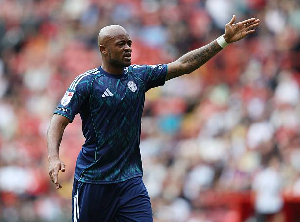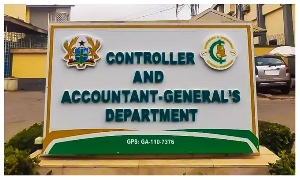Ghanaians will go to the polls next month to elect a new president and members of parliament. The incumbent president, John Agyekum Kufuor, having served two 4-year terms, is barred by law from seeking a third. President Kufuor's constitutionally-mandated departure, the second such event in the history of Ghana since independence half-a-century-plus ago, underscores the country's commitment to the rule of law.
As a nation, Ghana has every reason to be proud of its newfound status as a stable and progressive democracy in a neighborhood where brutal and chaotic dictatorships are the norm. The question is whether its politicians, whose pre-occupation with winning seems to trump everything, can play by the rules and help strengthen Ghanaian democracy. Appealing to ethnic, tribal, or religious sensibilities to influence the outcome of an election is about as democratic as paying people to vote for you. Yet that is exactly what the presidential candidates of the three major political parties in Ghana were doing when they found themselves in a virtual stampede against each other to pick running mates who hail from the northern part of Ghana. It's not a coincidence that all three VP choices are northerners as well as Muslims. Obviously, they were picked to please voters in a large swath of Ghana that is predominantly Muslim and whose people have a lot in common culturally.
Lest we be misunderstood, we want to state unequivocally that the critical stand we have taken on this issue has nothing to do with the ethnicity or religion of the three VP nominees. In our opinion, those factors are completely irrelevant if the goal is to find the right persons to shoulder the onerous responsibilities of government. We are rather concerned about the method employed in the selection of the VP candidates. Even though all three of them have stellar academic and professional credentials to their names, and even though no one can dispute their eligibility for the position for which they have been nominated, we still believe that the search for running mates should have been opened to the entire country. It may have been politically expedient for the presidential candidates to have running mates from that particular area of Ghana, but it was certainly unwise.
Apart from the possibility of uncovering many more talented prospective candidates that would have enabled the best possible choices to be made, a nation-wide selection process would have been more democratic, giving all Ghanaians the opportunity to fully participate in the election of their vice-president. As it were, only the north can actually claim credit, for better or worse, for the election of the country’s vice-president, whoever it turns out to be, the rest of the country merely rubber-stamping the choice during the general election.
Of course, some may argue that, since all the presidential candidates in the upcoming elections come from the south, it’s only fair that their running mates should be northerners. But that argument presumes that Ghana is a two-region entity of north and south, which it isn’t. It also overlooks the fact that southern Ghana is not a monolithic region. If anything, southern Ghana is more ethnically and religiously diverse than the northern half of the country, so that a presidential candidate who comes from any part of the south is not necessarily representative of the entire southern area of Ghana. Indeed, a pairing of northern and southern candidates on a presidential ticket has the same effect as a pairing of, say, Ashanti and Ewe candidates. Other communities in the south, not identifying with either the presidential candidate or his running mate ethnically, might still feel left out. Which renders the whole notion of presidential ticket-balancing in a multi-ethnic society like Ghana unrealistic since only two ethnic groups out of a multitude can be satisfied in any given presidential election, assuming that the presidential candidate and his partner come from different ethnic backgrounds. But if fairness is what it’s all about, then shouldn’t the next president of Ghana come from the north since both the outgoing president and his predecessor were so-called southerners? Why should the VP slot be permanently enshrined for northerners while the presidential position, which represents the ultimate political power, is reserved eternally for southerners? We think that there is nothing fair about this extra-constitutional arrangement. Rotating the presidency and vice-presidency is really not the issue, however. Improving the living conditions of the people is. Although the ruling NPP can proudly point to a number of significant achievements during its 8-year stewardship, the Kufuor government came up short in many crucial areas. These include unemployment, which is still unacceptably high; the health care system, which is urgently crying out for reforms so that the epidemic of preventable, needless deaths might at least be brought under control; and public utilities, which have become a national embarrassment, with electricity flicking on and off every two days or even every two hours, depending on where you live. These issues as well as a host of others need to be addressed urgently, but that will require a government composed of competent, selfless, and dedicated individuals, and choosing candidates for office based on ethnicity or religion is not the best way to find individuals of that caliber. For Ghana to succeed in its efforts to build a truly modern and progressive society, the politics must transcend parochialism of any kind and emphasize merit as the sole determinant for eligibility for public office. Not only would such an attitude be fair and democratic, it would also guarantee that only the most qualified people are chosen for both elective and appointed positions.












